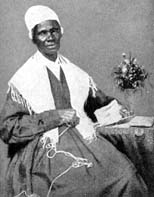
Ain’t I a Woman?
Sojourner Truth
(1797-1883)
That man over there says
That women need to be helped into carriages
And lifted over ditches,
And to have the best place everywhere
Nobody ever helps me into carriages
Or over mud-puddles,
Or gives me any best place!
And ain’t I a woman?
Look at me!
Look at my arm!
I have ploughed and planted,
And gathered into barns,
And no man could head me!
And ain’t I a woman?
I could work as much and eat as much as a man
When I could get it
And bear the lash as well
And ain’t I a woman?
I have borne thirteen children
And seen them most all sold off to slavery
And when I cried out with my mother’s grief
None but Jesus heard m1!
And ain’t I a woman?
That little man in black there,
He says women can’t have
As much rights as men
‘cause Christ wasn’t a woman!
Where did your Christ come from?
From God and a woman!
Man had nothing to do with Him!
If the first woman God ever made
Was strong enough to turn the world
Upside down all alone
These women together ought to be able to turn it back
And get it right side up again!
And now they is asking to do it
The men better let them.
Sojourner Truth, born as Isabella in Hurley, Ulster County, New York, was one early abolitionist and feminist in America. Before fleeing herself to freedom in 1827, she was a slave and had already witnessed the sale of two of her surviving children when she settled as a domestic servant with her youngest son and daughter in New York City around 1829.
In her most well-known speech above—Ain’t I a woman? we can see how she criticized the unfair treatment toward the Negro women confronted the appearance of the Cult of True Womanhood in the beginning of the nineteenth century.
One impact resulted in the Industrial Revolution in the beginning of the nineteenth America is the domesticity of women. Society considered women as the weaker sex so that women needed to be protected. While in the previous centuries women together with men could be the breadwinner for the family (such as doing agriculture, home industry), the industrial revolution with the establishing of factories spread all over America gave ideas to men to domesticate women at home and be the breeder, the cook, and the exclusive servant for the husband and the children they delivered. The reason—just like the reason mostly used by selfish men nowadays—was that men were already outside of home most of the time so that women had to stay home to take care of the children.
However, such principles were not applied to all women; they were only for white women coming from the middle and high social class. The “protection” was only given to them, but not to others, let’s say white women from low social class (e.g. the new immigrant who had to work hard to survive) and Negro women. This is exactly what Sojourner Truth criticized in her speech.
The impact of this application is:
For white women coming from middle and high social class, gradually working outside home was something coveted very much after they were bored to be domesticated and “protected”. Therefore they struggled to get their rights to be equal with men by pursuing career outside home. This could be seen as the one struggled by the second wave feminist movement in 1960s.
For Negro women—and also for women coming from low social class, working hard outside home bored them and they considered being a housewife—being idle, “only” doing household chores they believed not as hard as working outside to augment the income—as something luxurious. On the contrary of the white women coming from middle and high social class, they struggled something different.
Going back to Sojourner Truth’s speech, she also criticized the religious bodies that put women in the lower position than men with reason that Christ was a man. I am of opinion that Muslim women can also use the similar reason to respond Muslim men’s accusation that women are not as capable as men to be leaders or to have equal rights as men to pursue career outside home coz all prophets Muslim people know were men. Those selfish men use this “weapon” to eliminate any struggle for women to be leaders. As Amina Wadud illustrates in her book Quran and Woman: Rereading the Sacred Text from A Woman’s Perspective that men want to ignore the existence of women as the leaders in Alquran in order that men will always become the leaders in this world and women will only be the followers.
PT56 12.37 150706
No comments:
Post a Comment